International Management Report: Factors in a Globalized Economy
VerifiedAdded on 2023/01/06
|8
|2595
|81
Report
AI Summary
This report provides a comprehensive analysis of international management, focusing on expatriate success and failure. It explores the challenges of cultural adjustment for expatriates and their families, identifying factors that contribute to success, such as adaptability, family support, and tolerance for ambiguity. The report also examines the concept of a globalized economy, highlighting the roles of corporate social responsibility, trade policies, and tax systems in fostering international business and economic growth. The analysis includes real-world examples, such as the impact of cultural differences on expatriate performance and the influence of CSR on multinational corporations. The report concludes by summarizing key findings and emphasizing the importance of understanding these factors for effective international management.

INTERNATIONAL MANAGEMENT
1
1
Paraphrase This Document
Need a fresh take? Get an instant paraphrase of this document with our AI Paraphraser
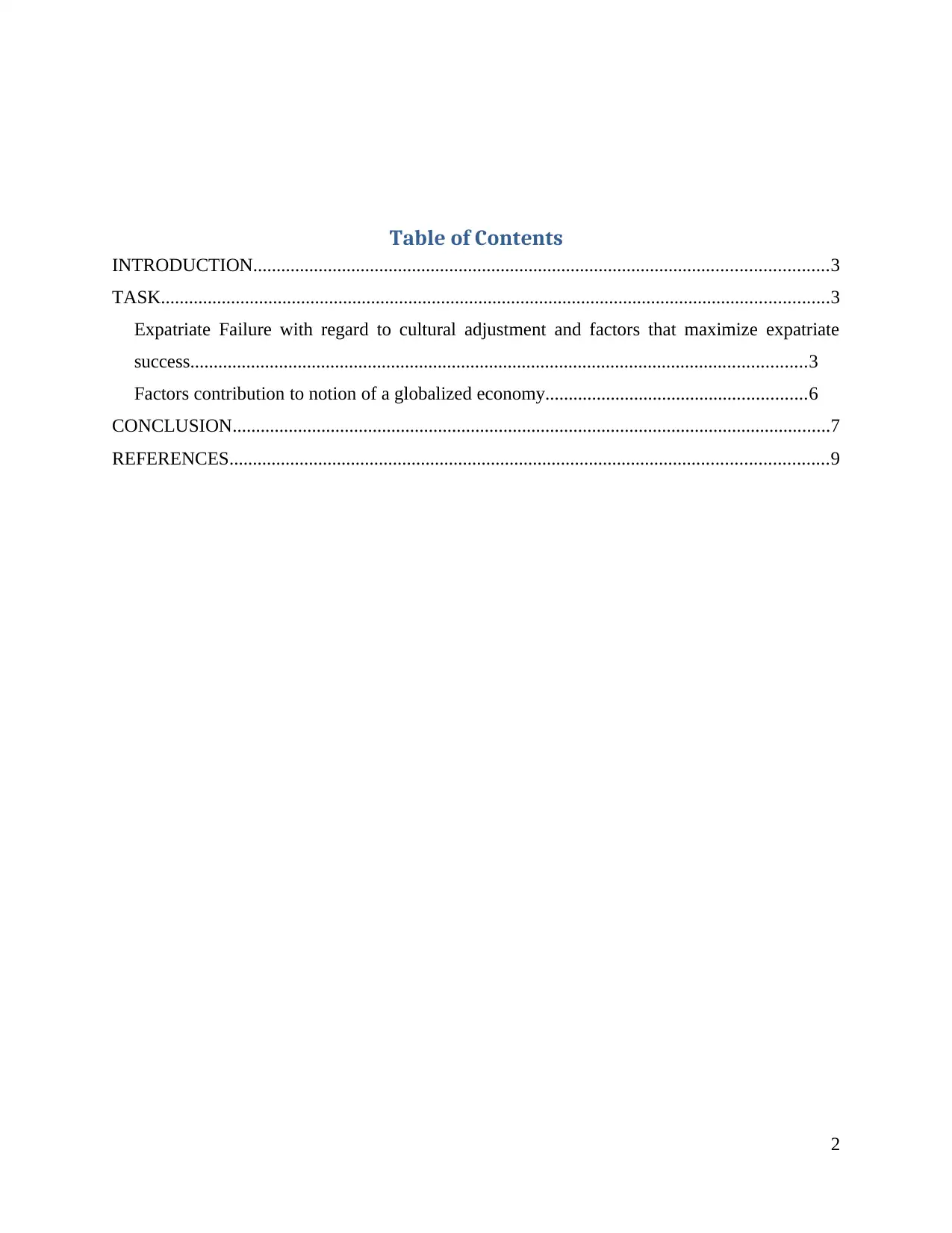
Table of Contents
INTRODUCTION...........................................................................................................................3
TASK...............................................................................................................................................3
Expatriate Failure with regard to cultural adjustment and factors that maximize expatriate
success....................................................................................................................................3
Factors contribution to notion of a globalized economy........................................................6
CONCLUSION................................................................................................................................7
REFERENCES................................................................................................................................9
2
INTRODUCTION...........................................................................................................................3
TASK...............................................................................................................................................3
Expatriate Failure with regard to cultural adjustment and factors that maximize expatriate
success....................................................................................................................................3
Factors contribution to notion of a globalized economy........................................................6
CONCLUSION................................................................................................................................7
REFERENCES................................................................................................................................9
2
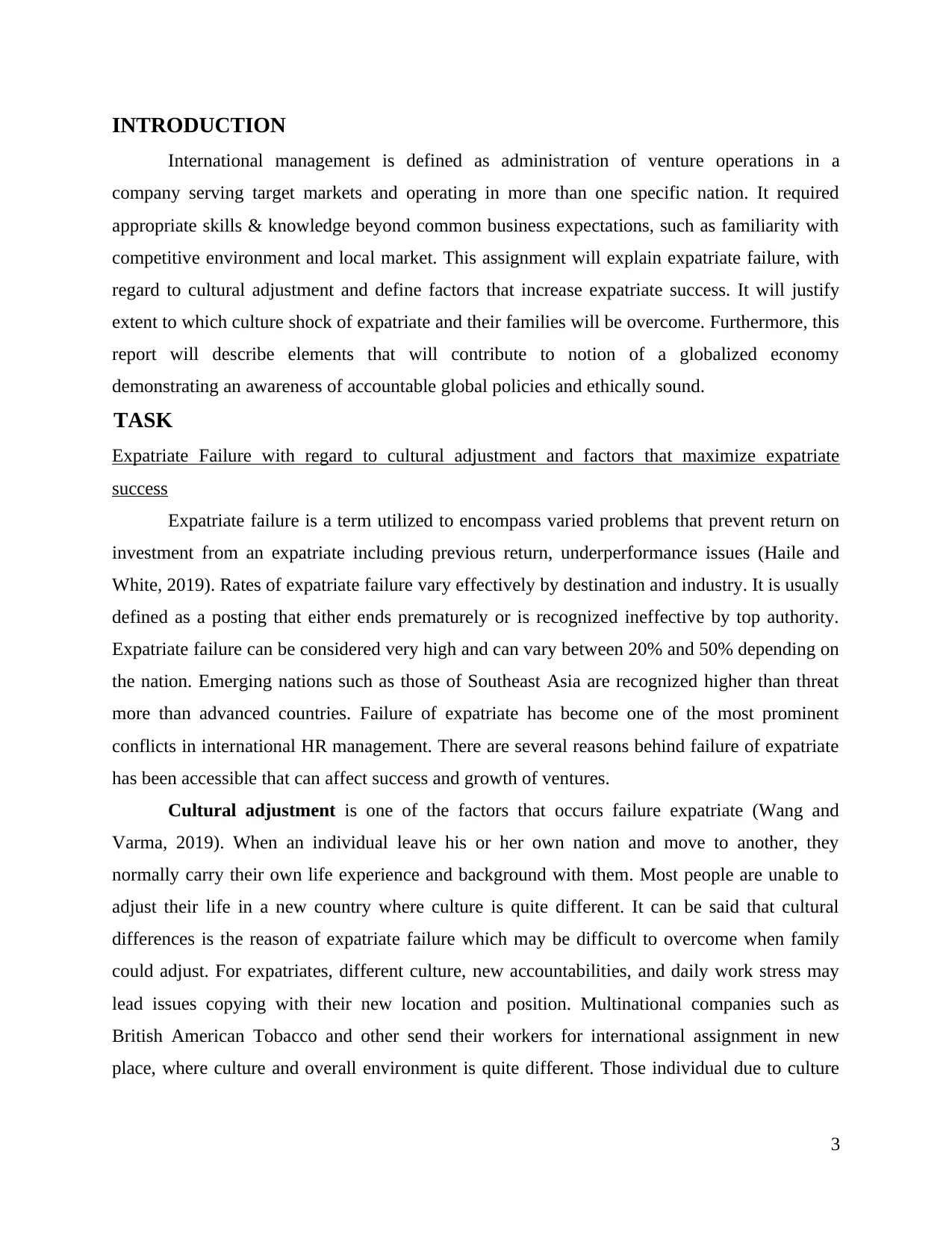
INTRODUCTION
International management is defined as administration of venture operations in a
company serving target markets and operating in more than one specific nation. It required
appropriate skills & knowledge beyond common business expectations, such as familiarity with
competitive environment and local market. This assignment will explain expatriate failure, with
regard to cultural adjustment and define factors that increase expatriate success. It will justify
extent to which culture shock of expatriate and their families will be overcome. Furthermore, this
report will describe elements that will contribute to notion of a globalized economy
demonstrating an awareness of accountable global policies and ethically sound.
TASK
Expatriate Failure with regard to cultural adjustment and factors that maximize expatriate
success
Expatriate failure is a term utilized to encompass varied problems that prevent return on
investment from an expatriate including previous return, underperformance issues (Haile and
White, 2019). Rates of expatriate failure vary effectively by destination and industry. It is usually
defined as a posting that either ends prematurely or is recognized ineffective by top authority.
Expatriate failure can be considered very high and can vary between 20% and 50% depending on
the nation. Emerging nations such as those of Southeast Asia are recognized higher than threat
more than advanced countries. Failure of expatriate has become one of the most prominent
conflicts in international HR management. There are several reasons behind failure of expatriate
has been accessible that can affect success and growth of ventures.
Cultural adjustment is one of the factors that occurs failure expatriate (Wang and
Varma, 2019). When an individual leave his or her own nation and move to another, they
normally carry their own life experience and background with them. Most people are unable to
adjust their life in a new country where culture is quite different. It can be said that cultural
differences is the reason of expatriate failure which may be difficult to overcome when family
could adjust. For expatriates, different culture, new accountabilities, and daily work stress may
lead issues copying with their new location and position. Multinational companies such as
British American Tobacco and other send their workers for international assignment in new
place, where culture and overall environment is quite different. Those individual due to culture
3
International management is defined as administration of venture operations in a
company serving target markets and operating in more than one specific nation. It required
appropriate skills & knowledge beyond common business expectations, such as familiarity with
competitive environment and local market. This assignment will explain expatriate failure, with
regard to cultural adjustment and define factors that increase expatriate success. It will justify
extent to which culture shock of expatriate and their families will be overcome. Furthermore, this
report will describe elements that will contribute to notion of a globalized economy
demonstrating an awareness of accountable global policies and ethically sound.
TASK
Expatriate Failure with regard to cultural adjustment and factors that maximize expatriate
success
Expatriate failure is a term utilized to encompass varied problems that prevent return on
investment from an expatriate including previous return, underperformance issues (Haile and
White, 2019). Rates of expatriate failure vary effectively by destination and industry. It is usually
defined as a posting that either ends prematurely or is recognized ineffective by top authority.
Expatriate failure can be considered very high and can vary between 20% and 50% depending on
the nation. Emerging nations such as those of Southeast Asia are recognized higher than threat
more than advanced countries. Failure of expatriate has become one of the most prominent
conflicts in international HR management. There are several reasons behind failure of expatriate
has been accessible that can affect success and growth of ventures.
Cultural adjustment is one of the factors that occurs failure expatriate (Wang and
Varma, 2019). When an individual leave his or her own nation and move to another, they
normally carry their own life experience and background with them. Most people are unable to
adjust their life in a new country where culture is quite different. It can be said that cultural
differences is the reason of expatriate failure which may be difficult to overcome when family
could adjust. For expatriates, different culture, new accountabilities, and daily work stress may
lead issues copying with their new location and position. Multinational companies such as
British American Tobacco and other send their workers for international assignment in new
place, where culture and overall environment is quite different. Those individual due to culture
3
⊘ This is a preview!⊘
Do you want full access?
Subscribe today to unlock all pages.

Trusted by 1+ million students worldwide
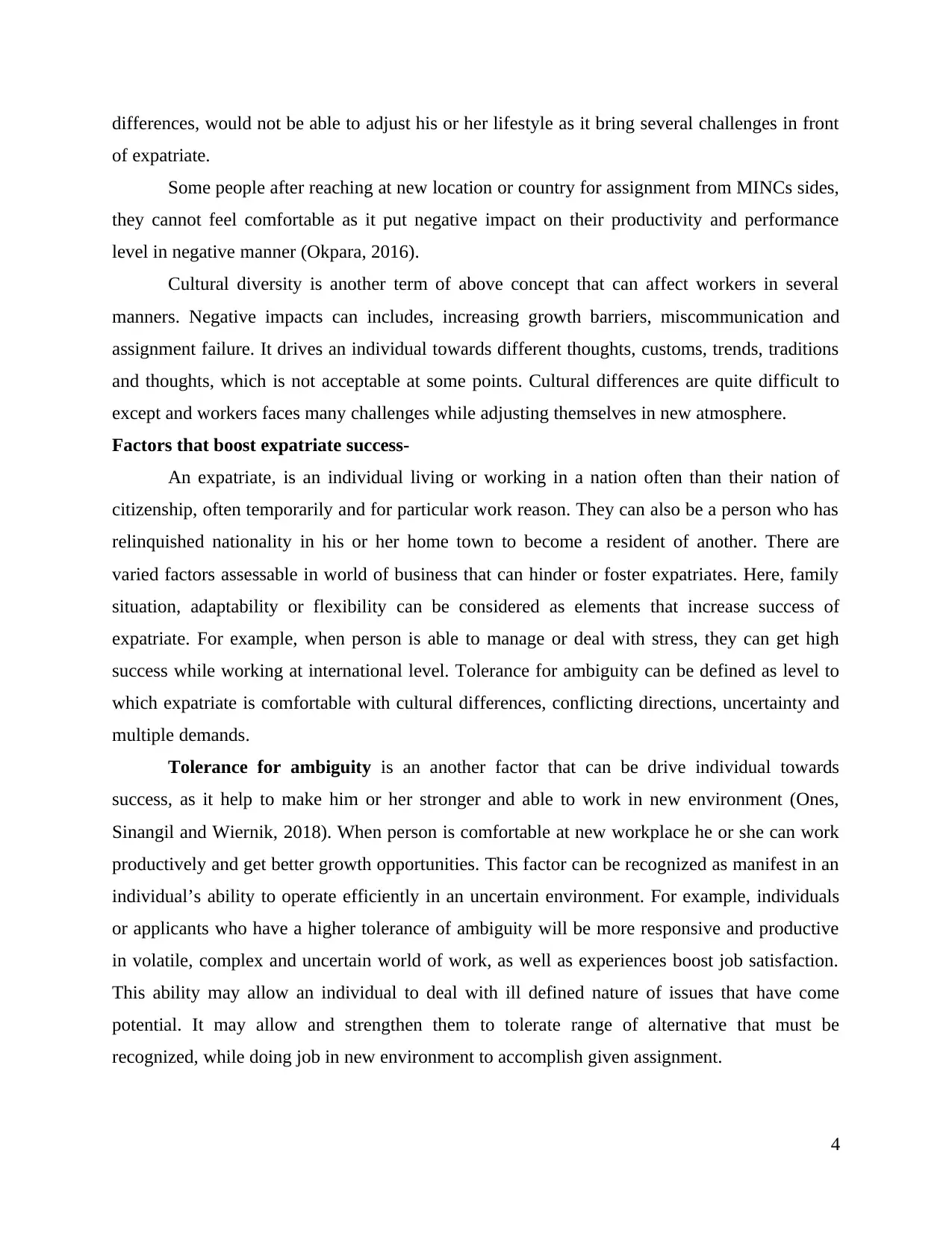
differences, would not be able to adjust his or her lifestyle as it bring several challenges in front
of expatriate.
Some people after reaching at new location or country for assignment from MINCs sides,
they cannot feel comfortable as it put negative impact on their productivity and performance
level in negative manner (Okpara, 2016).
Cultural diversity is another term of above concept that can affect workers in several
manners. Negative impacts can includes, increasing growth barriers, miscommunication and
assignment failure. It drives an individual towards different thoughts, customs, trends, traditions
and thoughts, which is not acceptable at some points. Cultural differences are quite difficult to
except and workers faces many challenges while adjusting themselves in new atmosphere.
Factors that boost expatriate success-
An expatriate, is an individual living or working in a nation often than their nation of
citizenship, often temporarily and for particular work reason. They can also be a person who has
relinquished nationality in his or her home town to become a resident of another. There are
varied factors assessable in world of business that can hinder or foster expatriates. Here, family
situation, adaptability or flexibility can be considered as elements that increase success of
expatriate. For example, when person is able to manage or deal with stress, they can get high
success while working at international level. Tolerance for ambiguity can be defined as level to
which expatriate is comfortable with cultural differences, conflicting directions, uncertainty and
multiple demands.
Tolerance for ambiguity is an another factor that can be drive individual towards
success, as it help to make him or her stronger and able to work in new environment (Ones,
Sinangil and Wiernik, 2018). When person is comfortable at new workplace he or she can work
productively and get better growth opportunities. This factor can be recognized as manifest in an
individual’s ability to operate efficiently in an uncertain environment. For example, individuals
or applicants who have a higher tolerance of ambiguity will be more responsive and productive
in volatile, complex and uncertain world of work, as well as experiences boost job satisfaction.
This ability may allow an individual to deal with ill defined nature of issues that have come
potential. It may allow and strengthen them to tolerate range of alternative that must be
recognized, while doing job in new environment to accomplish given assignment.
4
of expatriate.
Some people after reaching at new location or country for assignment from MINCs sides,
they cannot feel comfortable as it put negative impact on their productivity and performance
level in negative manner (Okpara, 2016).
Cultural diversity is another term of above concept that can affect workers in several
manners. Negative impacts can includes, increasing growth barriers, miscommunication and
assignment failure. It drives an individual towards different thoughts, customs, trends, traditions
and thoughts, which is not acceptable at some points. Cultural differences are quite difficult to
except and workers faces many challenges while adjusting themselves in new atmosphere.
Factors that boost expatriate success-
An expatriate, is an individual living or working in a nation often than their nation of
citizenship, often temporarily and for particular work reason. They can also be a person who has
relinquished nationality in his or her home town to become a resident of another. There are
varied factors assessable in world of business that can hinder or foster expatriates. Here, family
situation, adaptability or flexibility can be considered as elements that increase success of
expatriate. For example, when person is able to manage or deal with stress, they can get high
success while working at international level. Tolerance for ambiguity can be defined as level to
which expatriate is comfortable with cultural differences, conflicting directions, uncertainty and
multiple demands.
Tolerance for ambiguity is an another factor that can be drive individual towards
success, as it help to make him or her stronger and able to work in new environment (Ones,
Sinangil and Wiernik, 2018). When person is comfortable at new workplace he or she can work
productively and get better growth opportunities. This factor can be recognized as manifest in an
individual’s ability to operate efficiently in an uncertain environment. For example, individuals
or applicants who have a higher tolerance of ambiguity will be more responsive and productive
in volatile, complex and uncertain world of work, as well as experiences boost job satisfaction.
This ability may allow an individual to deal with ill defined nature of issues that have come
potential. It may allow and strengthen them to tolerate range of alternative that must be
recognized, while doing job in new environment to accomplish given assignment.
4
Paraphrase This Document
Need a fresh take? Get an instant paraphrase of this document with our AI Paraphraser
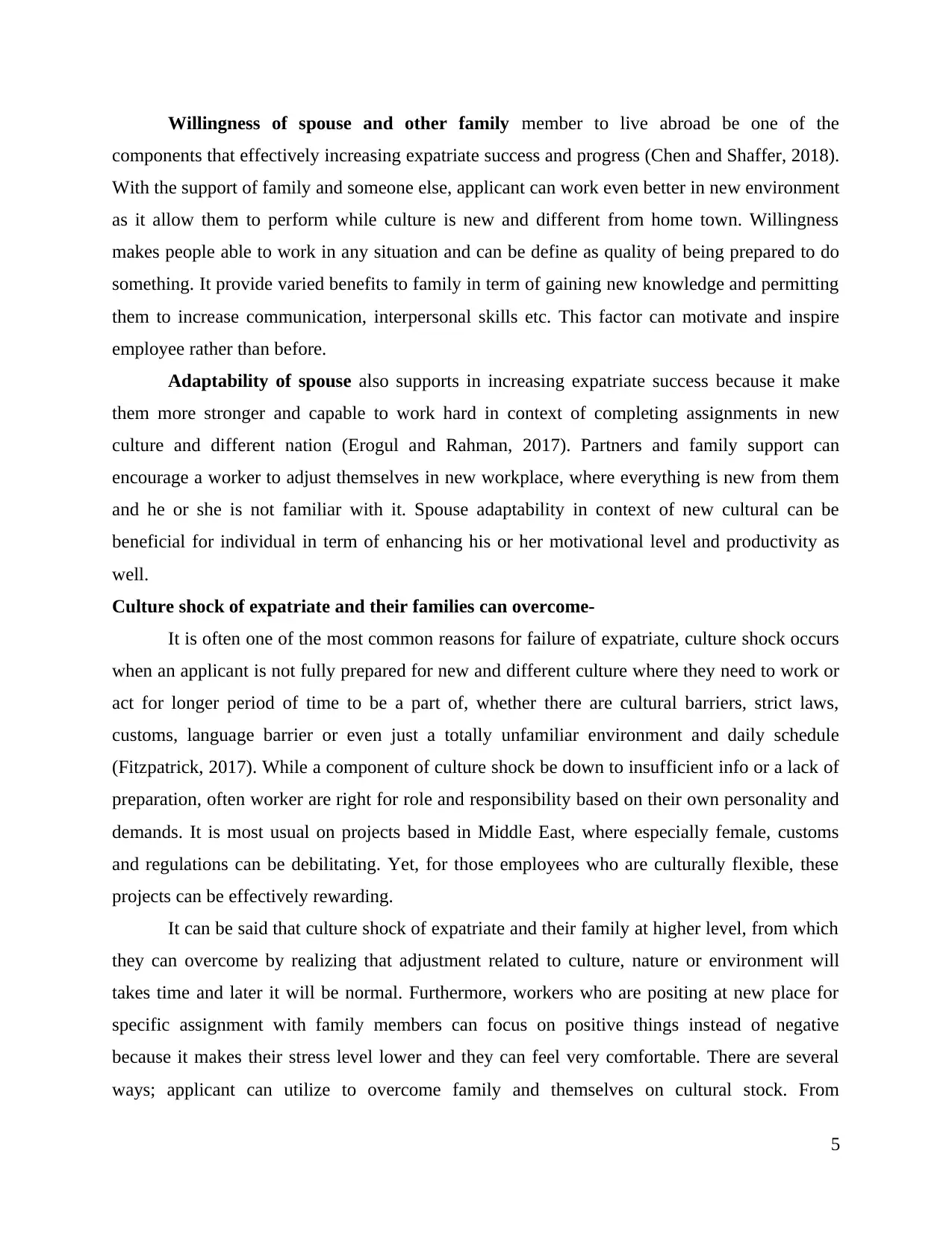
Willingness of spouse and other family member to live abroad be one of the
components that effectively increasing expatriate success and progress (Chen and Shaffer, 2018).
With the support of family and someone else, applicant can work even better in new environment
as it allow them to perform while culture is new and different from home town. Willingness
makes people able to work in any situation and can be define as quality of being prepared to do
something. It provide varied benefits to family in term of gaining new knowledge and permitting
them to increase communication, interpersonal skills etc. This factor can motivate and inspire
employee rather than before.
Adaptability of spouse also supports in increasing expatriate success because it make
them more stronger and capable to work hard in context of completing assignments in new
culture and different nation (Erogul and Rahman, 2017). Partners and family support can
encourage a worker to adjust themselves in new workplace, where everything is new from them
and he or she is not familiar with it. Spouse adaptability in context of new cultural can be
beneficial for individual in term of enhancing his or her motivational level and productivity as
well.
Culture shock of expatriate and their families can overcome-
It is often one of the most common reasons for failure of expatriate, culture shock occurs
when an applicant is not fully prepared for new and different culture where they need to work or
act for longer period of time to be a part of, whether there are cultural barriers, strict laws,
customs, language barrier or even just a totally unfamiliar environment and daily schedule
(Fitzpatrick, 2017). While a component of culture shock be down to insufficient info or a lack of
preparation, often worker are right for role and responsibility based on their own personality and
demands. It is most usual on projects based in Middle East, where especially female, customs
and regulations can be debilitating. Yet, for those employees who are culturally flexible, these
projects can be effectively rewarding.
It can be said that culture shock of expatriate and their family at higher level, from which
they can overcome by realizing that adjustment related to culture, nature or environment will
takes time and later it will be normal. Furthermore, workers who are positing at new place for
specific assignment with family members can focus on positive things instead of negative
because it makes their stress level lower and they can feel very comfortable. There are several
ways; applicant can utilize to overcome family and themselves on cultural stock. From
5
components that effectively increasing expatriate success and progress (Chen and Shaffer, 2018).
With the support of family and someone else, applicant can work even better in new environment
as it allow them to perform while culture is new and different from home town. Willingness
makes people able to work in any situation and can be define as quality of being prepared to do
something. It provide varied benefits to family in term of gaining new knowledge and permitting
them to increase communication, interpersonal skills etc. This factor can motivate and inspire
employee rather than before.
Adaptability of spouse also supports in increasing expatriate success because it make
them more stronger and capable to work hard in context of completing assignments in new
culture and different nation (Erogul and Rahman, 2017). Partners and family support can
encourage a worker to adjust themselves in new workplace, where everything is new from them
and he or she is not familiar with it. Spouse adaptability in context of new cultural can be
beneficial for individual in term of enhancing his or her motivational level and productivity as
well.
Culture shock of expatriate and their families can overcome-
It is often one of the most common reasons for failure of expatriate, culture shock occurs
when an applicant is not fully prepared for new and different culture where they need to work or
act for longer period of time to be a part of, whether there are cultural barriers, strict laws,
customs, language barrier or even just a totally unfamiliar environment and daily schedule
(Fitzpatrick, 2017). While a component of culture shock be down to insufficient info or a lack of
preparation, often worker are right for role and responsibility based on their own personality and
demands. It is most usual on projects based in Middle East, where especially female, customs
and regulations can be debilitating. Yet, for those employees who are culturally flexible, these
projects can be effectively rewarding.
It can be said that culture shock of expatriate and their family at higher level, from which
they can overcome by realizing that adjustment related to culture, nature or environment will
takes time and later it will be normal. Furthermore, workers who are positing at new place for
specific assignment with family members can focus on positive things instead of negative
because it makes their stress level lower and they can feel very comfortable. There are several
ways; applicant can utilize to overcome family and themselves on cultural stock. From
5
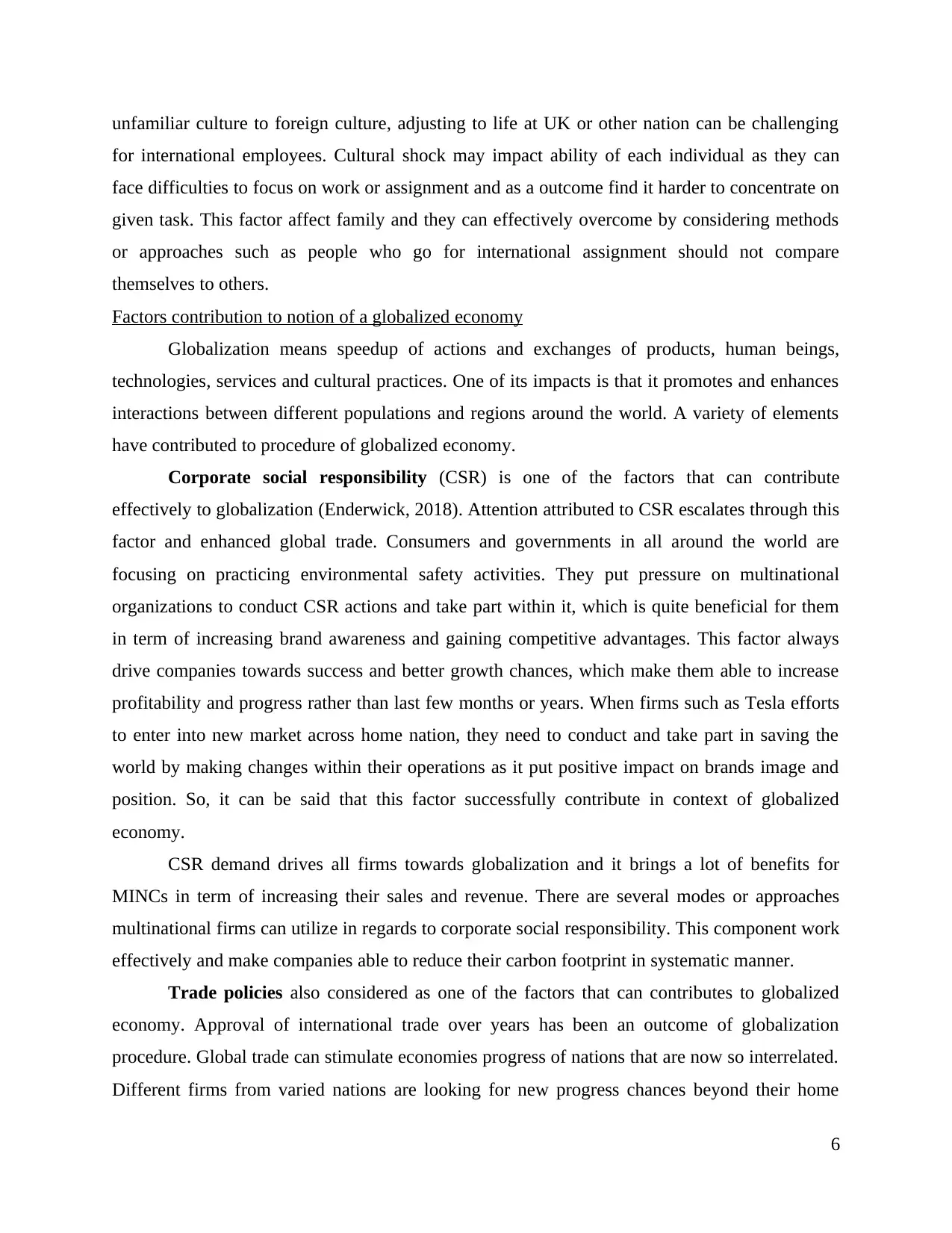
unfamiliar culture to foreign culture, adjusting to life at UK or other nation can be challenging
for international employees. Cultural shock may impact ability of each individual as they can
face difficulties to focus on work or assignment and as a outcome find it harder to concentrate on
given task. This factor affect family and they can effectively overcome by considering methods
or approaches such as people who go for international assignment should not compare
themselves to others.
Factors contribution to notion of a globalized economy
Globalization means speedup of actions and exchanges of products, human beings,
technologies, services and cultural practices. One of its impacts is that it promotes and enhances
interactions between different populations and regions around the world. A variety of elements
have contributed to procedure of globalized economy.
Corporate social responsibility (CSR) is one of the factors that can contribute
effectively to globalization (Enderwick, 2018). Attention attributed to CSR escalates through this
factor and enhanced global trade. Consumers and governments in all around the world are
focusing on practicing environmental safety activities. They put pressure on multinational
organizations to conduct CSR actions and take part within it, which is quite beneficial for them
in term of increasing brand awareness and gaining competitive advantages. This factor always
drive companies towards success and better growth chances, which make them able to increase
profitability and progress rather than last few months or years. When firms such as Tesla efforts
to enter into new market across home nation, they need to conduct and take part in saving the
world by making changes within their operations as it put positive impact on brands image and
position. So, it can be said that this factor successfully contribute in context of globalized
economy.
CSR demand drives all firms towards globalization and it brings a lot of benefits for
MINCs in term of increasing their sales and revenue. There are several modes or approaches
multinational firms can utilize in regards to corporate social responsibility. This component work
effectively and make companies able to reduce their carbon footprint in systematic manner.
Trade policies also considered as one of the factors that can contributes to globalized
economy. Approval of international trade over years has been an outcome of globalization
procedure. Global trade can stimulate economies progress of nations that are now so interrelated.
Different firms from varied nations are looking for new progress chances beyond their home
6
for international employees. Cultural shock may impact ability of each individual as they can
face difficulties to focus on work or assignment and as a outcome find it harder to concentrate on
given task. This factor affect family and they can effectively overcome by considering methods
or approaches such as people who go for international assignment should not compare
themselves to others.
Factors contribution to notion of a globalized economy
Globalization means speedup of actions and exchanges of products, human beings,
technologies, services and cultural practices. One of its impacts is that it promotes and enhances
interactions between different populations and regions around the world. A variety of elements
have contributed to procedure of globalized economy.
Corporate social responsibility (CSR) is one of the factors that can contribute
effectively to globalization (Enderwick, 2018). Attention attributed to CSR escalates through this
factor and enhanced global trade. Consumers and governments in all around the world are
focusing on practicing environmental safety activities. They put pressure on multinational
organizations to conduct CSR actions and take part within it, which is quite beneficial for them
in term of increasing brand awareness and gaining competitive advantages. This factor always
drive companies towards success and better growth chances, which make them able to increase
profitability and progress rather than last few months or years. When firms such as Tesla efforts
to enter into new market across home nation, they need to conduct and take part in saving the
world by making changes within their operations as it put positive impact on brands image and
position. So, it can be said that this factor successfully contribute in context of globalized
economy.
CSR demand drives all firms towards globalization and it brings a lot of benefits for
MINCs in term of increasing their sales and revenue. There are several modes or approaches
multinational firms can utilize in regards to corporate social responsibility. This component work
effectively and make companies able to reduce their carbon footprint in systematic manner.
Trade policies also considered as one of the factors that can contributes to globalized
economy. Approval of international trade over years has been an outcome of globalization
procedure. Global trade can stimulate economies progress of nations that are now so interrelated.
Different firms from varied nations are looking for new progress chances beyond their home
6
⊘ This is a preview!⊘
Do you want full access?
Subscribe today to unlock all pages.

Trusted by 1+ million students worldwide
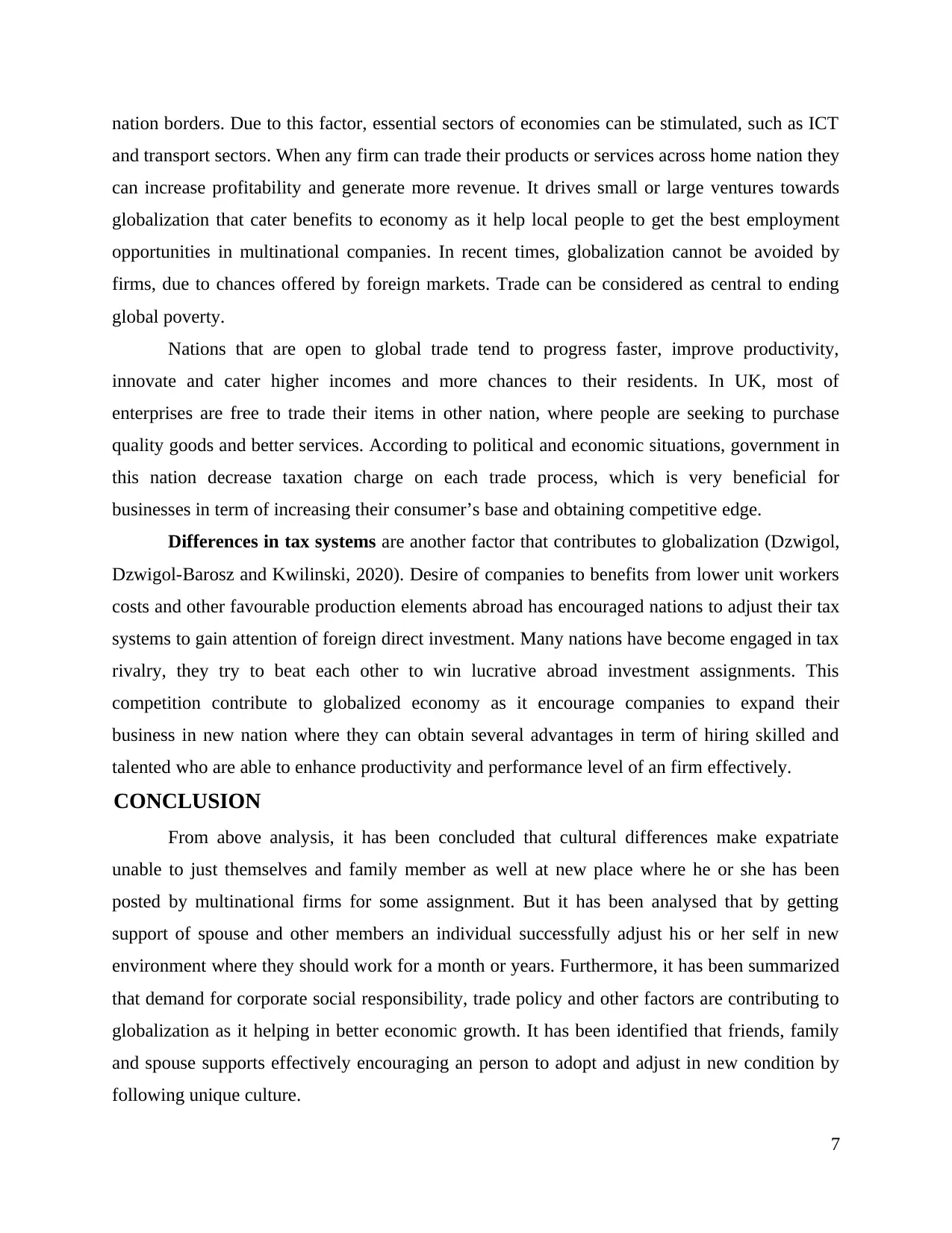
nation borders. Due to this factor, essential sectors of economies can be stimulated, such as ICT
and transport sectors. When any firm can trade their products or services across home nation they
can increase profitability and generate more revenue. It drives small or large ventures towards
globalization that cater benefits to economy as it help local people to get the best employment
opportunities in multinational companies. In recent times, globalization cannot be avoided by
firms, due to chances offered by foreign markets. Trade can be considered as central to ending
global poverty.
Nations that are open to global trade tend to progress faster, improve productivity,
innovate and cater higher incomes and more chances to their residents. In UK, most of
enterprises are free to trade their items in other nation, where people are seeking to purchase
quality goods and better services. According to political and economic situations, government in
this nation decrease taxation charge on each trade process, which is very beneficial for
businesses in term of increasing their consumer’s base and obtaining competitive edge.
Differences in tax systems are another factor that contributes to globalization (Dzwigol,
Dzwigol-Barosz and Kwilinski, 2020). Desire of companies to benefits from lower unit workers
costs and other favourable production elements abroad has encouraged nations to adjust their tax
systems to gain attention of foreign direct investment. Many nations have become engaged in tax
rivalry, they try to beat each other to win lucrative abroad investment assignments. This
competition contribute to globalized economy as it encourage companies to expand their
business in new nation where they can obtain several advantages in term of hiring skilled and
talented who are able to enhance productivity and performance level of an firm effectively.
CONCLUSION
From above analysis, it has been concluded that cultural differences make expatriate
unable to just themselves and family member as well at new place where he or she has been
posted by multinational firms for some assignment. But it has been analysed that by getting
support of spouse and other members an individual successfully adjust his or her self in new
environment where they should work for a month or years. Furthermore, it has been summarized
that demand for corporate social responsibility, trade policy and other factors are contributing to
globalization as it helping in better economic growth. It has been identified that friends, family
and spouse supports effectively encouraging an person to adopt and adjust in new condition by
following unique culture.
7
and transport sectors. When any firm can trade their products or services across home nation they
can increase profitability and generate more revenue. It drives small or large ventures towards
globalization that cater benefits to economy as it help local people to get the best employment
opportunities in multinational companies. In recent times, globalization cannot be avoided by
firms, due to chances offered by foreign markets. Trade can be considered as central to ending
global poverty.
Nations that are open to global trade tend to progress faster, improve productivity,
innovate and cater higher incomes and more chances to their residents. In UK, most of
enterprises are free to trade their items in other nation, where people are seeking to purchase
quality goods and better services. According to political and economic situations, government in
this nation decrease taxation charge on each trade process, which is very beneficial for
businesses in term of increasing their consumer’s base and obtaining competitive edge.
Differences in tax systems are another factor that contributes to globalization (Dzwigol,
Dzwigol-Barosz and Kwilinski, 2020). Desire of companies to benefits from lower unit workers
costs and other favourable production elements abroad has encouraged nations to adjust their tax
systems to gain attention of foreign direct investment. Many nations have become engaged in tax
rivalry, they try to beat each other to win lucrative abroad investment assignments. This
competition contribute to globalized economy as it encourage companies to expand their
business in new nation where they can obtain several advantages in term of hiring skilled and
talented who are able to enhance productivity and performance level of an firm effectively.
CONCLUSION
From above analysis, it has been concluded that cultural differences make expatriate
unable to just themselves and family member as well at new place where he or she has been
posted by multinational firms for some assignment. But it has been analysed that by getting
support of spouse and other members an individual successfully adjust his or her self in new
environment where they should work for a month or years. Furthermore, it has been summarized
that demand for corporate social responsibility, trade policy and other factors are contributing to
globalization as it helping in better economic growth. It has been identified that friends, family
and spouse supports effectively encouraging an person to adopt and adjust in new condition by
following unique culture.
7
Paraphrase This Document
Need a fresh take? Get an instant paraphrase of this document with our AI Paraphraser
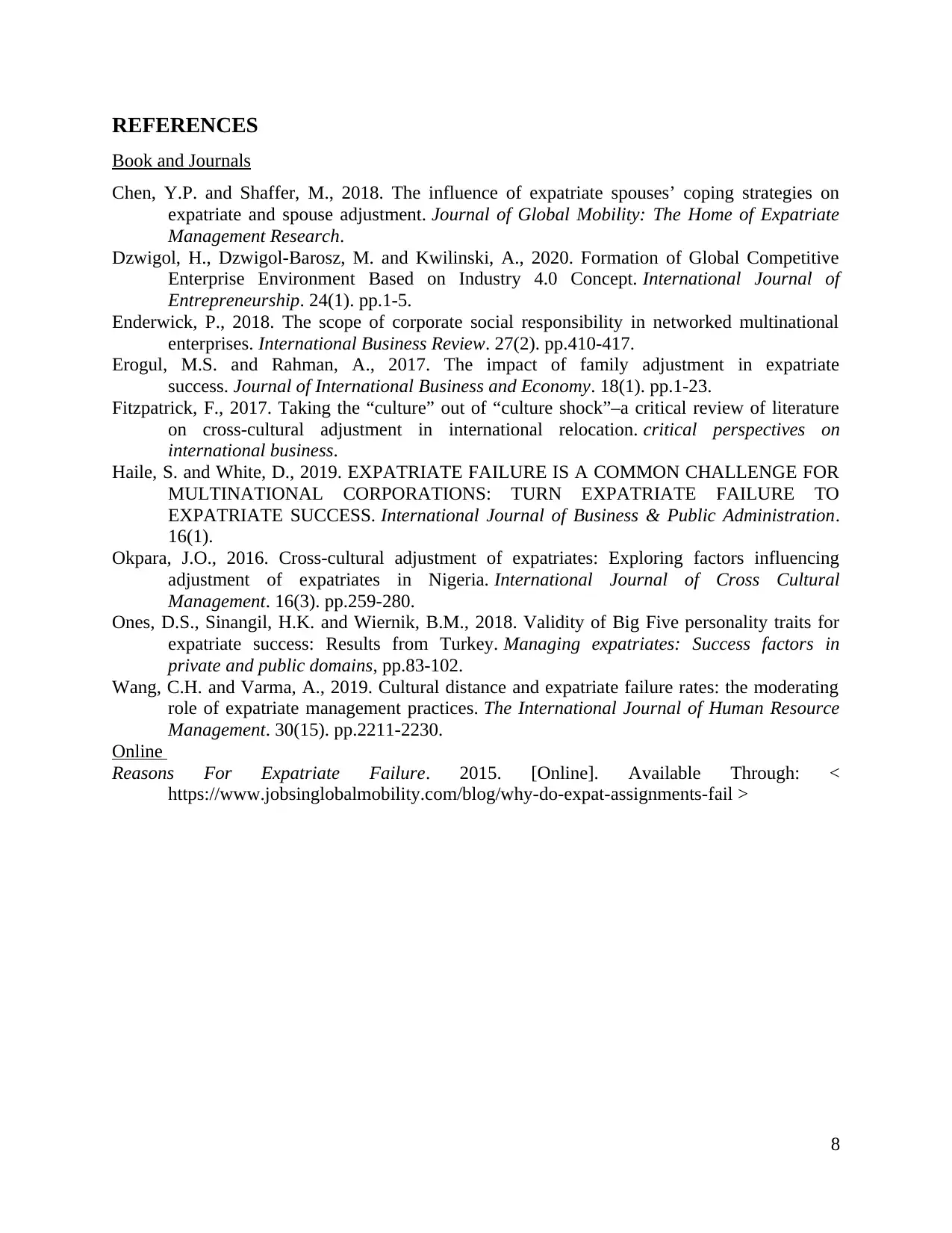
REFERENCES
Book and Journals
Chen, Y.P. and Shaffer, M., 2018. The influence of expatriate spouses’ coping strategies on
expatriate and spouse adjustment. Journal of Global Mobility: The Home of Expatriate
Management Research.
Dzwigol, H., Dzwigol-Barosz, M. and Kwilinski, A., 2020. Formation of Global Competitive
Enterprise Environment Based on Industry 4.0 Concept. International Journal of
Entrepreneurship. 24(1). pp.1-5.
Enderwick, P., 2018. The scope of corporate social responsibility in networked multinational
enterprises. International Business Review. 27(2). pp.410-417.
Erogul, M.S. and Rahman, A., 2017. The impact of family adjustment in expatriate
success. Journal of International Business and Economy. 18(1). pp.1-23.
Fitzpatrick, F., 2017. Taking the “culture” out of “culture shock”–a critical review of literature
on cross-cultural adjustment in international relocation. critical perspectives on
international business.
Haile, S. and White, D., 2019. EXPATRIATE FAILURE IS A COMMON CHALLENGE FOR
MULTINATIONAL CORPORATIONS: TURN EXPATRIATE FAILURE TO
EXPATRIATE SUCCESS. International Journal of Business & Public Administration.
16(1).
Okpara, J.O., 2016. Cross-cultural adjustment of expatriates: Exploring factors influencing
adjustment of expatriates in Nigeria. International Journal of Cross Cultural
Management. 16(3). pp.259-280.
Ones, D.S., Sinangil, H.K. and Wiernik, B.M., 2018. Validity of Big Five personality traits for
expatriate success: Results from Turkey. Managing expatriates: Success factors in
private and public domains, pp.83-102.
Wang, C.H. and Varma, A., 2019. Cultural distance and expatriate failure rates: the moderating
role of expatriate management practices. The International Journal of Human Resource
Management. 30(15). pp.2211-2230.
Online
Reasons For Expatriate Failure. 2015. [Online]. Available Through: <
https://www.jobsinglobalmobility.com/blog/why-do-expat-assignments-fail >
8
Book and Journals
Chen, Y.P. and Shaffer, M., 2018. The influence of expatriate spouses’ coping strategies on
expatriate and spouse adjustment. Journal of Global Mobility: The Home of Expatriate
Management Research.
Dzwigol, H., Dzwigol-Barosz, M. and Kwilinski, A., 2020. Formation of Global Competitive
Enterprise Environment Based on Industry 4.0 Concept. International Journal of
Entrepreneurship. 24(1). pp.1-5.
Enderwick, P., 2018. The scope of corporate social responsibility in networked multinational
enterprises. International Business Review. 27(2). pp.410-417.
Erogul, M.S. and Rahman, A., 2017. The impact of family adjustment in expatriate
success. Journal of International Business and Economy. 18(1). pp.1-23.
Fitzpatrick, F., 2017. Taking the “culture” out of “culture shock”–a critical review of literature
on cross-cultural adjustment in international relocation. critical perspectives on
international business.
Haile, S. and White, D., 2019. EXPATRIATE FAILURE IS A COMMON CHALLENGE FOR
MULTINATIONAL CORPORATIONS: TURN EXPATRIATE FAILURE TO
EXPATRIATE SUCCESS. International Journal of Business & Public Administration.
16(1).
Okpara, J.O., 2016. Cross-cultural adjustment of expatriates: Exploring factors influencing
adjustment of expatriates in Nigeria. International Journal of Cross Cultural
Management. 16(3). pp.259-280.
Ones, D.S., Sinangil, H.K. and Wiernik, B.M., 2018. Validity of Big Five personality traits for
expatriate success: Results from Turkey. Managing expatriates: Success factors in
private and public domains, pp.83-102.
Wang, C.H. and Varma, A., 2019. Cultural distance and expatriate failure rates: the moderating
role of expatriate management practices. The International Journal of Human Resource
Management. 30(15). pp.2211-2230.
Online
Reasons For Expatriate Failure. 2015. [Online]. Available Through: <
https://www.jobsinglobalmobility.com/blog/why-do-expat-assignments-fail >
8
1 out of 8
Related Documents
Your All-in-One AI-Powered Toolkit for Academic Success.
+13062052269
info@desklib.com
Available 24*7 on WhatsApp / Email
![[object Object]](/_next/static/media/star-bottom.7253800d.svg)
Unlock your academic potential
Copyright © 2020–2026 A2Z Services. All Rights Reserved. Developed and managed by ZUCOL.





